Note
Click here to download the full example code
Compares implementations of ReduceSum#
This example compares the numpy.sum from numpy, to onnxruntime implementation. If available, tensorflow and pytorch are included as well.
Available optimisation#
The code shows which parallelisation optimisation could be used, AVX or SSE and the number of available processors.
import numpy
import pandas
import matplotlib.pyplot as plt
from onnxruntime import InferenceSession
from skl2onnx.common.data_types import FloatTensorType
from skl2onnx.algebra.onnx_ops import OnnxReduceSumApi11
from cpyquickhelper.numbers import measure_time
from tqdm import tqdm
from mlprodict.testing.experimental_c_impl.experimental_c import (
code_optimisation, custom_reducesum_rk_float)
print(code_optimisation())
AVX-omp=8
ReduceSum implementations#
try:
from tensorflow.math import reduce_sum as tf_reduce_sum
from tensorflow import convert_to_tensor
except ImportError:
tf_reduce_sum = None
try:
from torch import sum as torch_sum, from_numpy
except ImportError:
torch_sum = None
def build_ort_reducesum(axes, op_version=14): # opset=13, 14, ...
node = OnnxReduceSumApi11('x', axes=axes, op_version=op_version,
output_names=['z'])
onx = node.to_onnx(inputs=[('x', FloatTensorType())],
target_opset=op_version)
sess = InferenceSession(onx.SerializeToString())
return lambda x, y: sess.run(None, {'x': x})
def loop_fct(fct, xs, ys):
for x, y in zip(xs, ys):
fct(x, y)
def benchmark_op(axes, repeat=5, number=5, name="ReduceSum", shape_fct=None,
custom_impl=False):
if shape_fct is None:
def shape_fct(dim):
return (3, dim, 1, 128, 64)
ort_fct = build_ort_reducesum(axes)
res = []
for dim in tqdm([8, 16, 32, 64, 100, 128, 200,
256, 400, 512, 1024]):
shape = shape_fct(dim)
n_arrays = 10 if dim < 512 else 4
xs = [numpy.random.rand(*shape).astype(numpy.float32)
for _ in range(n_arrays)]
ys = [numpy.array(axes, dtype=numpy.int64)
for _ in range(n_arrays)]
info = dict(axes=axes, shape=shape)
# numpy
ctx = dict(
xs=xs, ys=ys,
fct=lambda x, y: numpy.sum(x, *y),
loop_fct=loop_fct)
obs = measure_time(
"loop_fct(fct, xs, ys)",
div_by_number=True, context=ctx, repeat=repeat, number=number)
obs['dim'] = dim
obs['fct'] = 'numpy'
obs.update(info)
res.append(obs)
# onnxruntime
ctx['fct'] = ort_fct
obs = measure_time(
"loop_fct(fct, xs, ys)",
div_by_number=True, context=ctx, repeat=repeat, number=number)
obs['dim'] = dim
obs['fct'] = 'ort'
obs.update(info)
res.append(obs)
if custom_impl:
if axes != (0, ):
raise RuntimeError(
f"Unexpected axes={axes!r}.")
ctx['fct'] = lambda x, y: custom_reducesum_rk_float(x)
ctx['xs'] = [x.reshape((x.shape[0], -1)).copy() for x in xs]
obs = measure_time(
"loop_fct(fct, xs, ys)",
div_by_number=True, context=ctx, repeat=repeat, number=number)
obs['dim'] = dim
obs['fct'] = 'custom'
obs.update(info)
res.append(obs)
if tf_reduce_sum is not None:
# tensorflow
ctx['fct'] = tf_reduce_sum
ctx['xs'] = [convert_to_tensor(x) for x in xs]
ctx['ys'] = ys
obs = measure_time(
"loop_fct(fct, xs, ys)",
div_by_number=True, context=ctx, repeat=repeat, number=number)
obs['dim'] = dim
obs['fct'] = 'tf'
obs.update(info)
res.append(obs)
if torch_sum is not None:
def torch_sum1(x, y):
return torch_sum(x, y[0])
def torch_sum2(x, y):
return torch_sum(torch_sum(x, y[1]), y[0])
# torch
ctx['fct'] = torch_sum1 if len(axes) == 1 else torch_sum2
ctx['xs'] = [from_numpy(x) for x in xs]
ctx['ys'] = ys # [from_numpy(y) for y in ys]
obs = measure_time(
"loop_fct(fct, xs, ys)",
div_by_number=True, context=ctx, repeat=repeat, number=number)
obs['dim'] = dim
obs['fct'] = 'torch'
obs.update(info)
res.append(obs)
# Dataframes
shape_name = str(shape).replace(str(dim), "N")
df = pandas.DataFrame(res)
df.columns = [_.replace('dim', 'N') for _ in df.columns]
piv = df.pivot('N', 'fct', 'average')
rs = piv.copy()
for c in ['ort', 'torch', 'tf', 'tf_copy']:
if c in rs.columns:
rs[c] = rs['numpy'] / rs[c]
rs['numpy'] = 1.
# Graphs.
fig, ax = plt.subplots(1, 2, figsize=(12, 4))
piv.plot(logx=True, logy=True, ax=ax[0],
title=f"{name} benchmark\n{shape_name!r} - {axes!r} lower better")
ax[0].legend(prop={"size": 9})
rs.plot(logx=True, logy=True, ax=ax[1],
title="%s Speedup, baseline=numpy\n%r - %r"
" higher better" % (name, shape_name, axes))
ax[1].plot([min(rs.index), max(rs.index)], [0.5, 0.5], 'g--')
ax[1].plot([min(rs.index), max(rs.index)], [2., 2.], 'g--')
ax[1].legend(prop={"size": 9})
return df, rs, ax
dfs = []
Reduction on a particular case KR#
Consecutive axis not reduced and consecutive reduced axis are merged. KR means kept axis - reduced axis
(8, 24, 48, N), axis=(3, )#
axes = (3, )
df, piv, ax = benchmark_op(axes, shape_fct=lambda dim: (8, 24, 48, dim))
dfs.append(df)
df.pivot("fct", "N", "average")
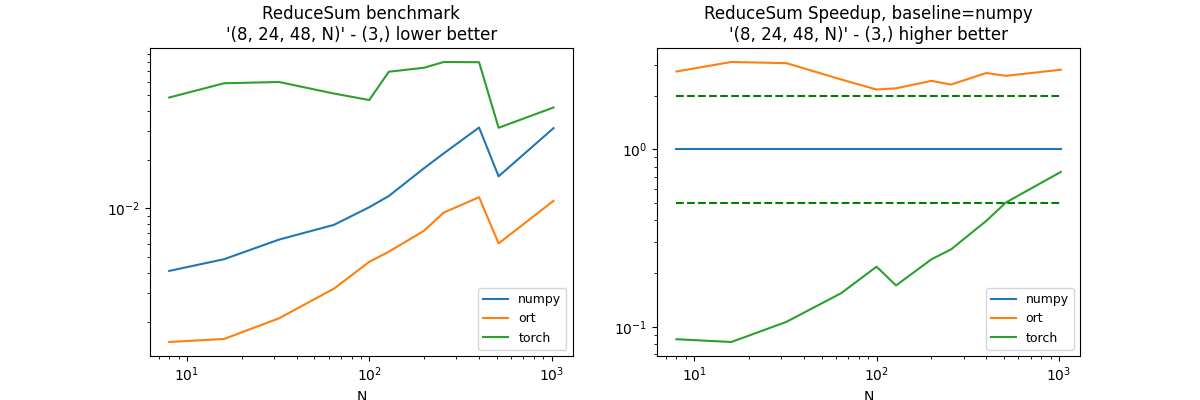
0%| | 0/11 [00:00<?, ?it/s]
9%|9 | 1/11 [00:01<00:13, 1.37s/it]
18%|#8 | 2/11 [00:03<00:13, 1.55s/it]
27%|##7 | 3/11 [00:04<00:13, 1.66s/it]
36%|###6 | 4/11 [00:06<00:11, 1.68s/it]
45%|####5 | 5/11 [00:08<00:10, 1.71s/it]
55%|#####4 | 6/11 [00:10<00:09, 1.97s/it]
64%|######3 | 7/11 [00:13<00:09, 2.28s/it]
73%|#######2 | 8/11 [00:17<00:07, 2.62s/it]
82%|########1 | 9/11 [00:21<00:06, 3.04s/it]
91%|######### | 10/11 [00:22<00:02, 2.66s/it]
100%|##########| 11/11 [00:25<00:00, 2.77s/it]
100%|##########| 11/11 [00:25<00:00, 2.35s/it]
somewhere/workspace/mlprodict/mlprodict_UT_39_std/_doc/examples/plot_op_reducesum.py:151: FutureWarning: In a future version of pandas all arguments of DataFrame.pivot will be keyword-only.
piv = df.pivot('N', 'fct', 'average')
somewhere/workspace/mlprodict/mlprodict_UT_39_std/_doc/examples/plot_op_reducesum.py:189: FutureWarning: In a future version of pandas all arguments of DataFrame.pivot will be keyword-only.
df.pivot("fct", "N", "average")
Reduction on a particular case RK#
Consecutive axis not reduced and consecutive reduced axis are merged. RK means reduced axis - kept axis
(8, 24, 48, N), axis=(0, )#
axes = (0, )
df, piv, ax = benchmark_op(axes, shape_fct=lambda dim: (8, 24, 48, dim),
custom_impl=True)
dfs.append(df)
df.pivot("fct", "N", "average")
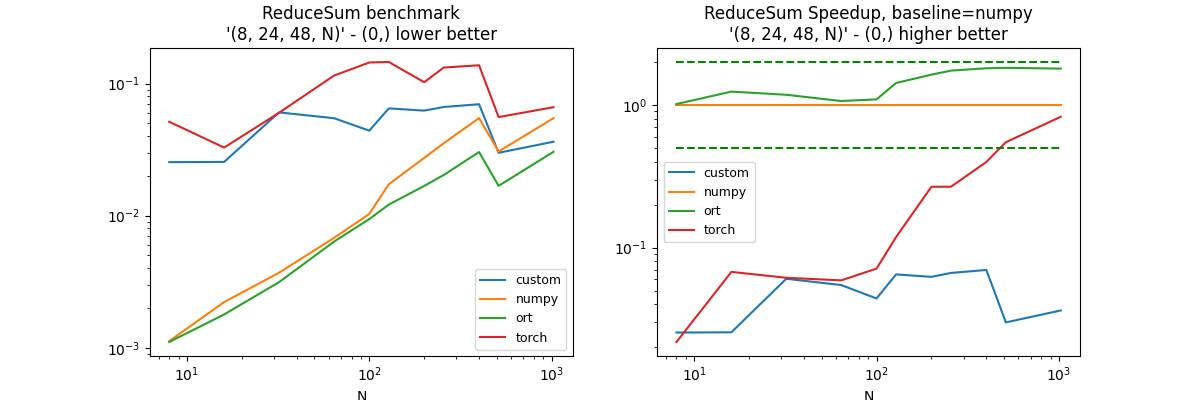
0%| | 0/11 [00:00<?, ?it/s]
9%|9 | 1/11 [00:01<00:19, 2.00s/it]
18%|#8 | 2/11 [00:03<00:15, 1.77s/it]
27%|##7 | 3/11 [00:06<00:19, 2.45s/it]
36%|###6 | 4/11 [00:11<00:23, 3.35s/it]
45%|####5 | 5/11 [00:17<00:24, 4.11s/it]
55%|#####4 | 6/11 [00:23<00:24, 4.86s/it]
64%|######3 | 7/11 [00:29<00:20, 5.13s/it]
73%|#######2 | 8/11 [00:36<00:17, 5.71s/it]
82%|########1 | 9/11 [00:44<00:13, 6.51s/it]
91%|######### | 10/11 [00:48<00:05, 5.68s/it]
100%|##########| 11/11 [00:53<00:00, 5.67s/it]
100%|##########| 11/11 [00:53<00:00, 4.89s/it]
somewhere/workspace/mlprodict/mlprodict_UT_39_std/_doc/examples/plot_op_reducesum.py:151: FutureWarning: In a future version of pandas all arguments of DataFrame.pivot will be keyword-only.
piv = df.pivot('N', 'fct', 'average')
somewhere/workspace/mlprodict/mlprodict_UT_39_std/_doc/examples/plot_op_reducesum.py:206: FutureWarning: In a future version of pandas all arguments of DataFrame.pivot will be keyword-only.
df.pivot("fct", "N", "average")
Reduction on a particular case KRK#
Consecutive axis not reduced and consecutive reduced axis are merged. KRK means kept axis - reduced axis - kept axis,
(8, 24, 48, N), axis=(1, 2)#
axes = (1, 2)
df, piv, ax = benchmark_op(axes, shape_fct=lambda dim: (8, 24, 48, dim))
dfs.append(df)
df.pivot("fct", "N", "average")
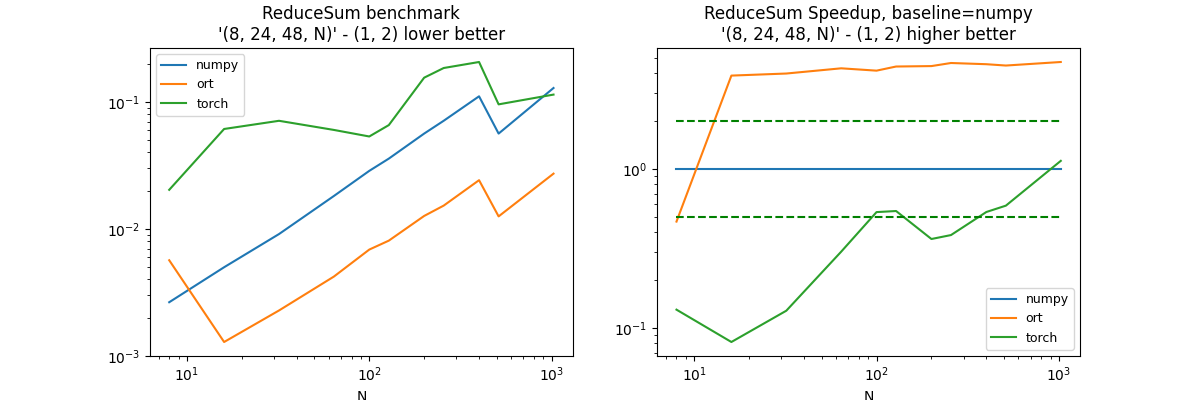
0%| | 0/11 [00:00<?, ?it/s]
9%|9 | 1/11 [00:00<00:07, 1.36it/s]
18%|#8 | 2/11 [00:02<00:11, 1.32s/it]
27%|##7 | 3/11 [00:04<00:13, 1.69s/it]
36%|###6 | 4/11 [00:06<00:13, 1.90s/it]
45%|####5 | 5/11 [00:09<00:12, 2.10s/it]
55%|#####4 | 6/11 [00:12<00:12, 2.41s/it]
64%|######3 | 7/11 [00:18<00:14, 3.60s/it]
73%|#######2 | 8/11 [00:25<00:14, 4.80s/it]
82%|########1 | 9/11 [00:35<00:12, 6.24s/it]
91%|######### | 10/11 [00:39<00:05, 5.73s/it]
100%|##########| 11/11 [00:47<00:00, 6.32s/it]
100%|##########| 11/11 [00:47<00:00, 4.31s/it]
somewhere/workspace/mlprodict/mlprodict_UT_39_std/_doc/examples/plot_op_reducesum.py:151: FutureWarning: In a future version of pandas all arguments of DataFrame.pivot will be keyword-only.
piv = df.pivot('N', 'fct', 'average')
somewhere/workspace/mlprodict/mlprodict_UT_39_std/_doc/examples/plot_op_reducesum.py:222: FutureWarning: In a future version of pandas all arguments of DataFrame.pivot will be keyword-only.
df.pivot("fct", "N", "average")
(8, 24 * 48, N), axis=1#
axes = (1, )
df, piv, ax = benchmark_op(axes, shape_fct=lambda dim: (8, 24 * 48, dim))
dfs.append(df)
df.pivot("fct", "N", "average")
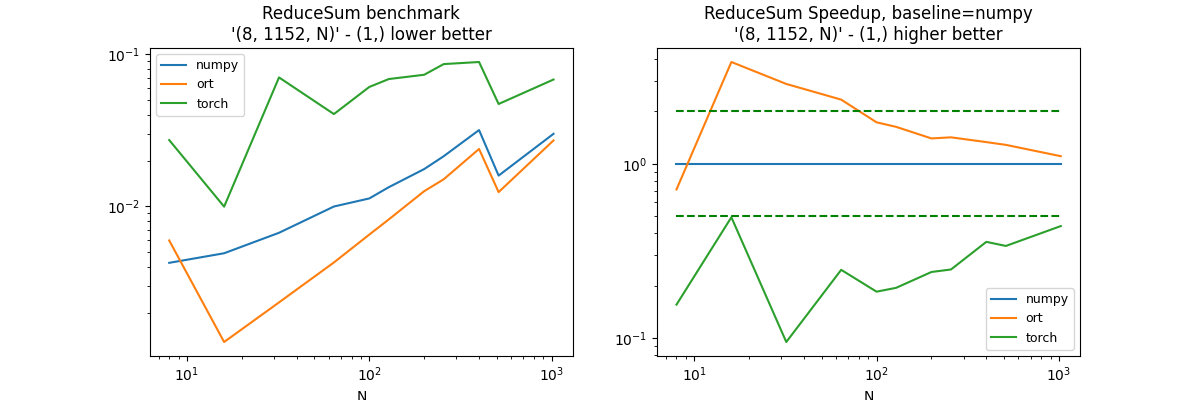
0%| | 0/11 [00:00<?, ?it/s]
9%|9 | 1/11 [00:00<00:09, 1.04it/s]
18%|#8 | 2/11 [00:01<00:05, 1.52it/s]
27%|##7 | 3/11 [00:03<00:10, 1.30s/it]
36%|###6 | 4/11 [00:04<00:09, 1.39s/it]
45%|####5 | 5/11 [00:07<00:10, 1.68s/it]
55%|#####4 | 6/11 [00:09<00:09, 1.98s/it]
64%|######3 | 7/11 [00:12<00:09, 2.33s/it]
73%|#######2 | 8/11 [00:16<00:08, 2.75s/it]
82%|########1 | 9/11 [00:20<00:06, 3.30s/it]
91%|######### | 10/11 [00:23<00:03, 3.01s/it]
100%|##########| 11/11 [00:27<00:00, 3.33s/it]
100%|##########| 11/11 [00:27<00:00, 2.49s/it]
somewhere/workspace/mlprodict/mlprodict_UT_39_std/_doc/examples/plot_op_reducesum.py:151: FutureWarning: In a future version of pandas all arguments of DataFrame.pivot will be keyword-only.
piv = df.pivot('N', 'fct', 'average')
somewhere/workspace/mlprodict/mlprodict_UT_39_std/_doc/examples/plot_op_reducesum.py:231: FutureWarning: In a future version of pandas all arguments of DataFrame.pivot will be keyword-only.
df.pivot("fct", "N", "average")
(2, 8, 12, 24, 2, N), axis=(2, 3)#
axes = (2, 3)
df, piv, ax = benchmark_op(axes, shape_fct=lambda dim: (2, 8, 12, 24, 2, dim))
dfs.append(df)
df.pivot("fct", "N", "average")
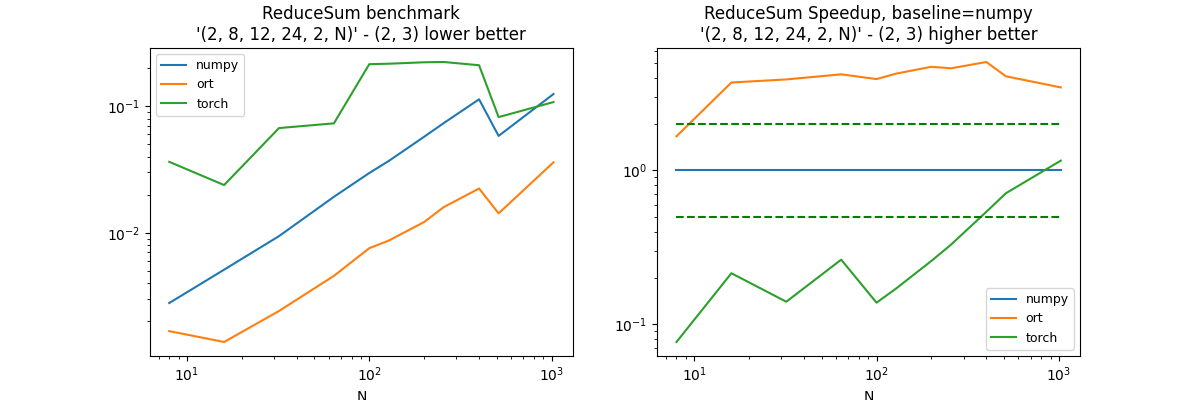
0%| | 0/11 [00:00<?, ?it/s]
9%|9 | 1/11 [00:01<00:10, 1.04s/it]
18%|#8 | 2/11 [00:01<00:08, 1.11it/s]
27%|##7 | 3/11 [00:03<00:11, 1.43s/it]
36%|###6 | 4/11 [00:06<00:13, 1.88s/it]
45%|####5 | 5/11 [00:13<00:21, 3.56s/it]
55%|#####4 | 6/11 [00:19<00:23, 4.68s/it]
64%|######3 | 7/11 [00:27<00:22, 5.68s/it]
73%|#######2 | 8/11 [00:36<00:19, 6.55s/it]
82%|########1 | 9/11 [00:45<00:14, 7.49s/it]
91%|######### | 10/11 [00:49<00:06, 6.52s/it]
100%|##########| 11/11 [00:57<00:00, 6.86s/it]
100%|##########| 11/11 [00:57<00:00, 5.23s/it]
somewhere/workspace/mlprodict/mlprodict_UT_39_std/_doc/examples/plot_op_reducesum.py:151: FutureWarning: In a future version of pandas all arguments of DataFrame.pivot will be keyword-only.
piv = df.pivot('N', 'fct', 'average')
somewhere/workspace/mlprodict/mlprodict_UT_39_std/_doc/examples/plot_op_reducesum.py:240: FutureWarning: In a future version of pandas all arguments of DataFrame.pivot will be keyword-only.
df.pivot("fct", "N", "average")
Reduction on a particular case RKRK#
(8, 24, 48, N), axis=(0, 2)#
axes = (0, 2)
df, piv, ax = benchmark_op(axes, shape_fct=lambda dim: (8, 24, 48, dim))
dfs.append(df)
df.pivot("fct", "N", "average")
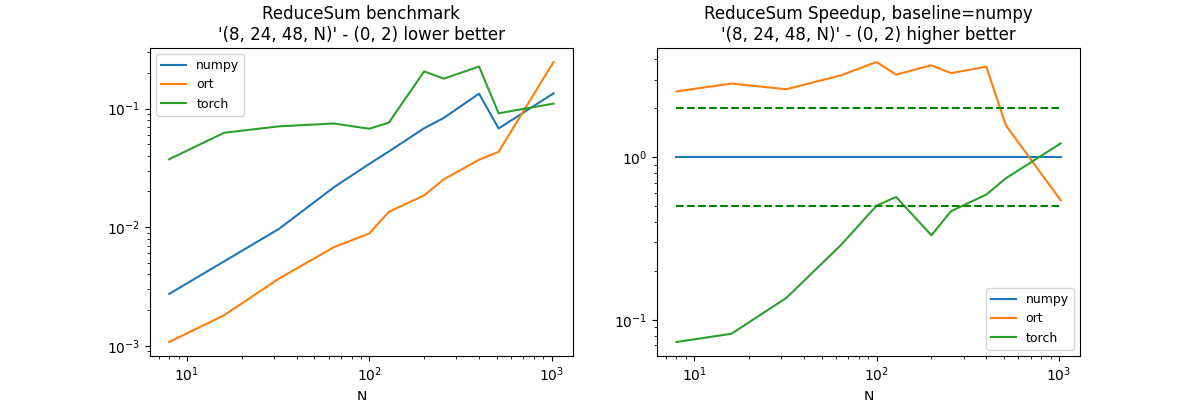
0%| | 0/11 [00:00<?, ?it/s]
9%|9 | 1/11 [00:01<00:10, 1.05s/it]
18%|#8 | 2/11 [00:02<00:13, 1.48s/it]
27%|##7 | 3/11 [00:05<00:14, 1.80s/it]
36%|###6 | 4/11 [00:07<00:15, 2.17s/it]
45%|####5 | 5/11 [00:10<00:14, 2.46s/it]
55%|#####4 | 6/11 [00:14<00:14, 2.86s/it]
64%|######3 | 7/11 [00:22<00:17, 4.46s/it]
73%|#######2 | 8/11 [00:29<00:16, 5.51s/it]
82%|########1 | 9/11 [00:40<00:14, 7.17s/it]
91%|######### | 10/11 [00:46<00:06, 6.66s/it]
100%|##########| 11/11 [00:59<00:00, 8.66s/it]
100%|##########| 11/11 [00:59<00:00, 5.40s/it]
somewhere/workspace/mlprodict/mlprodict_UT_39_std/_doc/examples/plot_op_reducesum.py:151: FutureWarning: In a future version of pandas all arguments of DataFrame.pivot will be keyword-only.
piv = df.pivot('N', 'fct', 'average')
somewhere/workspace/mlprodict/mlprodict_UT_39_std/_doc/examples/plot_op_reducesum.py:252: FutureWarning: In a future version of pandas all arguments of DataFrame.pivot will be keyword-only.
df.pivot("fct", "N", "average")
Conclusion#
Some of the configurations should be investigated. l-reducesum-problem1. The reduction on tensorflow in one dimension seems to be lazy.
merged = pandas.concat(dfs)
name = "reducesum"
merged.to_csv(f"plot_{name}.csv", index=False)
merged.to_excel(f"plot_{name}.xlsx", index=False)
plt.savefig(f"plot_{name}.png")
plt.show()

Total running time of the script: ( 4 minutes 43.395 seconds)